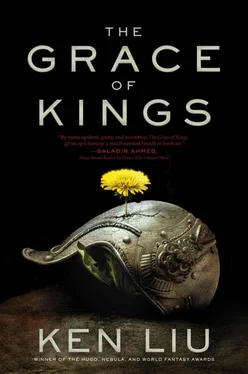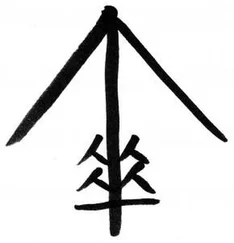Sometimes a soldier would exchange a knowing smile with a woodsman standing by the side of the trail.
War was fought mostly for the benefit of the nobles, and it was best if it could be fought quickly so as to bother the common people the least. King Kuni at least seemed to honor that principle.
The Dasu army came to a small and shallow river about fifty feet wide. It was now spring, and the river, swelled by the melting of winter snow, ran cold and fast. Mazoti could see the defenders of Rima on the other side. They were not stationed at the shore, however, but stood about a mile off.
“Why are they so far off?” one of Mazoti’s aides-de-camp asked. “It’s not as if they are holding a hill either. There’s no tactical advantage to their position.”
Mazoti saw the black flags of Rima waving in the distance. The one in the middle was extra large, with golden borders.
“King Zato is with them. That would explain the bizarre location of Rima troops. Kon Fiji wrote in his books that it is not moral to attack an army while it’s still fording a river. The defenders must give the attackers enough room to cross the river and set up its formation on the other side so that the fight will be fair.”
“Kon Fiji wrote about military tactics?”
“That old fraud wrote about lots of things he knew nothing about. But we should thank him. Since Zato is such a faithful disciple of everything Kon Fiji taught, we’ll have a safe crossing.”
Five hundred of Mazoti’s men crossed over first and set up defensive lines on the other side of the river, just in case the Rima forces did attack. To avoid being swept away by the swift currents, the rest of the troops linked their arms and held on to one another as they forded the river. At the deepest part of the river, the water covered their chests. Officers and soldiers alike worried that the defenders might decide to charge when the bulk of the Dasu army was still on the north side of the river or in the middle of the crossing. They would be defenseless in the water.
But true to Marshal Mazoti’s words, King Zato’s men stayed where they were and watched Mazoti’s army cross without harassing them.
“Unbelievable,” the aide-de-camp said in wonder as the soldiers laid out their gear on the grassy banks to dry. The Rima forces still made no move.

The officers around King Zato were ready to pull their hair out.
“Sire, we must attack now, before Mazoti’s troops complete the crossing.”
“Nonsense. We outnumber her forces three to one. Besides, she’s a woman. Kon Fiji wrote that an army imbued with righteousness would defeat an army steeped in immorality. How can attacking the enemy before they are ready to defend themselves be righteous?”
“Sire, we must attack now, before her men put their armor back on.”
“You wish to besmirch the name of our army? What would King Jizu, the Pure-Hearted Ruler, say of your plots? No, we must wait. Besides, look how she’s gathering her soldiers into formation! Kon Fiji taught us that when there’s a river around, one should never set up the infantry so that the soldiers’ backs are against the river because they will have no room to maneuver. We gave them plenty of space to properly form up, yet Mazoti is lining up her men against the shore of the river.
“I wonder if she has ever read the wise books of Kon Fiji or even can read at all. Poor men of Dasu! To be led by an ignorant girl into death is a truly tragic fate!”

“You’re taking a page from Mata Zyndu’s exploits, aren’t you?” Mazoti’s aide asked. He glanced back at the tight ranks of men right behind him, all the way back to the shore of the river. There was no room to retreat. The only way to go was forward.
“I’ve always said that we should make use of every advantage we can find,” Gin Mazoti said evenly. “Mata Zyndu had the right idea on Wolf’s Paw. Why shouldn’t I copy him? Putting your own men into a position where they believe they are dead unless they win is a good tactic — as long as it’s not used too often.”
They waited, as the forces of Rima finally began to move toward them.

King Zato’s soldiers pressed on, hoping to drive Mazoti’s five thousand men right into the water. But Mazoti’s men dug their heels in and fought with a ferocity that their opponents could not match.
The battle lasted all afternoon, but by the time twilight descended over the banks, Mazoti’s smaller force had the definite upper hand.
Finally, King Zato’s lines collapsed, and the surviving soldiers of Rima scattered into the woods.
Mazoti wiped the blood from her face and congratulated her soldiers. It was not quite as impressive a victory as Mata Zyndu’s at Wolf’s Paw, but for Mazoti’s men, it was a solid win that felt good after their humiliating defeat at Zudi.

Meanwhile, far to the north, Luan Zya’s fishing skiff pulled into the harbor at Boama, capital of Faça.
Faça was a land of craggy coastlines and rugged highlands in the north, where most of the population ranched, and deep valleys and sunny hillsides in the south, where most of the population planted orchards. Fruitful Faça was where one found sheep with the thickest wool, cattle with the fattest shoulders, and apples that were crisp and sweet, with a sun-kissed bite that lingered in the mouth.
The fierce fighters of Faça were as rugged as the terrain. They could move over the highlands faster than horsemen and were skilled at turning the landscape’s jagged rocky outcroppings and the capricious, ever-present fog against their enemies. Faça’s traditional swordfighting techniques were different from Cocru’s but no less effective: They emphasized surprise, unpredictability, and quick footwork.
Faça had rarely been successfully invaded in the past. Mapidéré’s conquest of Faça relied on assassinations, plots, and the deaths of many Xana soldiers as they finally overwhelmed the determined defenders through sheer advantage of numbers.
Another invasion of Faça would be costly.
Luan did not want to see Kuni or Gin repeat such a feat with the blood of Dasu, and so he had come to Boama in secret to try to persuade the greedy, crafty, politic King Shilué to surrender.
If I can.

The Palace of Boama was built right on the shore, over a cliff plunging into the ocean. Fog drifted through its courtyards and porticoed halls, making the castle seem to float in the clouds.
“King Kuni has always treated his followers with generosity,” Luan began. “Have you not heard that he negotiated for the return of his generals, Mün Çakri and Than Carucono, even before he asked for the return of his family? Have you not heard how Théca Kimo is now duke of the three islands of Arulugi, Crescent, and Écofi? Have you not heard how Marquess Puma Yemu, by raiding in the king’s name, now has a treasure hoard larger than the treasuries of many Tiro kings? King Kuni rewards those who fight for him.”
Shilué sat opposite Luan, carefully chewing oysters and listening without speaking. In the fog-filtered light, the expression on his pale face was unreadable, and his blond hair glowed like a veil.
Luan went on. “But Mata Zyndu has always treated his followers with whim and jealousy. Have you not heard how the hegemon stripped Puma Yemu of his title and land? Have you not heard how he blamed Noda Mi and Doru Solofi for losing Géfica and abused them with words of contempt and mockery until they left him in disgrace? Have you not seen how he hesitated to hand out the seals of power and was sorrowful at having to distribute treasure to men who risked life and limb for him? Mata Zyndu is not a lord you can rely on.”
Читать дальше













